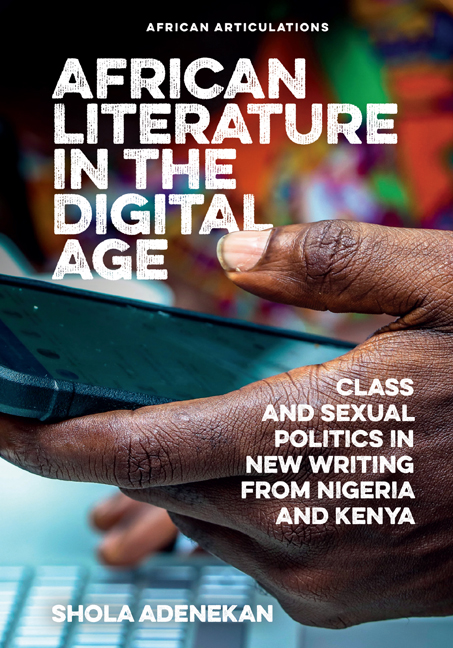 African Literature in the Digital Age
African Literature in the Digital Age Book contents
- Frontmatter
- Dedication
- Contents
- List of Illustrations
- Acknowledgements
- List of Abbreviations
- Introduction: Kenyan and Nigerian Writers in the Digital Age
- 1 Network Thinking: Literary Networks in the Digital Age
- 2 Class and Poetry in the Digital Age
- 3 Class Consciousness in Online Fictions
- 4 Digital Queer: The Queering of African Literature
- 5 Middle-Class, Transnational, Queer, and African
- 6 ‘Ashewo no be job’: The Figure of the Modern Girl in the Digital Age
- 7 The Erotic in New Writing from Nigeria
- 8 Social Media and the Aesthetics of the Quotidian
- Conclusion: Connecting the Dots
- Bibliography
- Index
- Miscellaneous Endmatter
6 - ‘Ashewo no be job’: The Figure of the Modern Girl in the Digital Age
- Frontmatter
- Dedication
- Contents
- List of Illustrations
- Acknowledgements
- List of Abbreviations
- Introduction: Kenyan and Nigerian Writers in the Digital Age
- 1 Network Thinking: Literary Networks in the Digital Age
- 2 Class and Poetry in the Digital Age
- 3 Class Consciousness in Online Fictions
- 4 Digital Queer: The Queering of African Literature
- 5 Middle-Class, Transnational, Queer, and African
- 6 ‘Ashewo no be job’: The Figure of the Modern Girl in the Digital Age
- 7 The Erotic in New Writing from Nigeria
- 8 Social Media and the Aesthetics of the Quotidian
- Conclusion: Connecting the Dots
- Bibliography
- Index
- Miscellaneous Endmatter
Summary
The text is home to thoughts
and its context the rudder
steering readers from flaws.
The text is voice inscribed in cold print,
Readers with mental tools can decode
Signs, symbols, & codes within.
Texts respond to texts, linking
writers with a past not seen.
The inter-text, hidden between the lines
only the alert can bring to live.
(Koleade Odutola xvii)Much of the creative work that came out of the first half of the last century looked at alienation and disaffection, which fictional narrators and readers of literature regularly blamed on growing urbanisation and the negative effect of modernity on young people, especially young women. Nowadays, several short stories that are being published in the digital space are still preoccupied with the life of urban dwellers and the mannerisms of those who are identified with that space. In the twenty-first century, members of the digital public who are commenting on these stories are as fascinated by the subject as were previous generations. When examining urban settings, I am referring to the lived practices and representations through which a variety of spaces are constituted within the scope of cities such as Lagos and Nairobi. In this chapter, I use creative writings, published over the course of a century across print and digital mediums, to historicise the interest –of writers and readers alike –in the trope of the modern girl. If we analyse some of the creative writings online, we see a continuation of the tradition where texts and images report on intimacy. From the precolonial era to the colonial period and to the digital era, the African body, as a sexual being, has always been at the centre of political discourses, through artistic interventions. The artworks of societies such as the ancient Benin and Yoruba (Oyo) kingdoms underlined the intersection of sexuality with religion and politics, especially among the ruling classes of that era. Several verses in Odu-Ifa (the Yoruba main theological text) are poems that are sexually explicit, with some graphically depicting the pleasure of sex. Carvings and statues in many ruling houses include imagery of nudity and the erotic.
- Type
- Chapter
- Information
- African Literature in the Digital AgeClass and Sexual Politics in New Writing from Nigeria and Kenya, pp. 113 - 128Publisher: Boydell & BrewerPrint publication year: 2021


